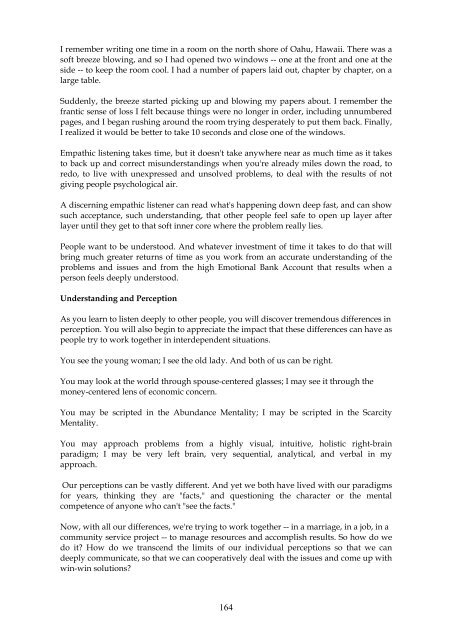Covey - The 7 habits of highly effective people
Create successful ePaper yourself
Turn your PDF publications into a flip-book with our unique Google optimized e-Paper software.
I remember writing one time in a room on the north shore <strong>of</strong> Oahu, Hawaii. <strong>The</strong>re was a<br />
s<strong>of</strong>t breeze blowing, and so I had opened two windows -- one at the front and one at the<br />
side -- to keep the room cool. I had a number <strong>of</strong> papers laid out, chapter by chapter, on a<br />
large table.<br />
Suddenly, the breeze started picking up and blowing my papers about. I remember the<br />
frantic sense <strong>of</strong> loss I felt because things were no longer in order, including unnumbered<br />
pages, and I began rushing around the room trying desperately to put them back. Finally,<br />
I realized it would be better to take 10 seconds and close one <strong>of</strong> the windows.<br />
Empathic listening takes time, but it doesn't take anywhere near as much time as it takes<br />
to back up and correct misunderstandings when you're already miles down the road, to<br />
redo, to live with unexpressed and unsolved problems, to deal with the results <strong>of</strong> not<br />
giving <strong>people</strong> psychological air.<br />
A discerning empathic listener can read what's happening down deep fast, and can show<br />
such acceptance, such understanding, that other <strong>people</strong> feel safe to open up layer after<br />
layer until they get to that s<strong>of</strong>t inner core where the problem really lies.<br />
People want to be understood. And whatever investment <strong>of</strong> time it takes to do that will<br />
bring much greater returns <strong>of</strong> time as you work from an accurate understanding <strong>of</strong> the<br />
problems and issues and from the high Emotional Bank Account that results when a<br />
person feels deeply understood.<br />
Understanding and Perception<br />
As you learn to listen deeply to other <strong>people</strong>, you will discover tremendous differences in<br />
perception. You will also begin to appreciate the impact that these differences can have as<br />
<strong>people</strong> try to work together in interdependent situations.<br />
You see the young woman; I see the old lady. And both <strong>of</strong> us can be right.<br />
You may look at the world through spouse-centered glasses; I may see it through the<br />
money-centered lens <strong>of</strong> economic concern.<br />
You may be scripted in the Abundance Mentality; I may be scripted in the Scarcity<br />
Mentality.<br />
You may approach problems from a <strong>highly</strong> visual, intuitive, holistic right-brain<br />
paradigm; I may be very left brain, very sequential, analytical, and verbal in my<br />
approach.<br />
Our perceptions can be vastly different. And yet we both have lived with our paradigms<br />
for years, thinking they are "facts," and questioning the character or the mental<br />
competence <strong>of</strong> anyone who can't "see the facts."<br />
Now, with all our differences, we're trying to work together -- in a marriage, in a job, in a<br />
community service project -- to manage resources and accomplish results. So how do we<br />
do it? How do we transcend the limits <strong>of</strong> our individual perceptions so that we can<br />
deeply communicate, so that we can cooperatively deal with the issues and come up with<br />
win-win solutions?<br />
164


